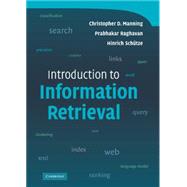
Introduction to Information Retrieval
- ISBN13: 9780521865715
- ISBN10: 0521865719
- eBook ISBN(s): 9780511410802
- Format: Hardcover
- Copyright: 2008-07-07
- Publisher: Cambridge University Press
Note: Supplemental materials are not guaranteed with Rental or Used book purchases.
-
Your order must be $35 or more to qualify for free economy shipping. Bulk sales, PO's, Marketplace items, eBooks and apparel do not qualify for this offer.








